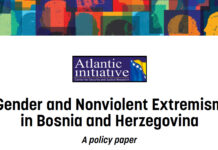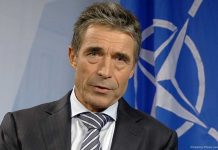By JUDY DEMPSEY
Published: May 26, 2010
BERLIN — Ankara mightily irritated the big powers last week by brokering a uranium exchange deal with Iran.
The United States was not pleased that Turkey, with support from Brazil, bypassed the United Nations. There was nothing in the deal about Iran suspending its uranium enrichment program — the most disputed issue between Iran and the United States. Washington suspects that Iran is pursuing the enrichment program to produce nuclear weapons.
Secretary of State Hillary Rodham Clinton swiftly sidestepped Turkey’s initiative by announcing that the five permanent members of the U.N. Security Council — Britain, China, France, Russia and the United States — plus Germany had agreed to seek a new round of sanctions against Tehran.
Her remarks were a blow to Turkey’s pride. They also exposed the hurdles Ankara faces in implementing a new foreign policy that seeks to resolve disputes with its neighbors — Iraq, Armenia, Syria and Iran. That policy, known as zero problems, is also about moving Turkey out of the shadow of the United States, its traditional ally, making it a regional player on its own terms. Iran was the first high-profile test of that strategy.
“Turkey is trying to become a major player in the region, which means it has to rebalance its relationship with the U.S.,” said Ozgur Unluhisarcikli, director of the Ankara office of the German Marshall Fund of the United States. “In the case of Iran, Turkey does not want a U.S. or Israeli strike. It does not want sanctions. Turkey knows that sanctions did not work against Saddam Hussein’s Iraq during the 1990s.”
Turkey had another reason in trying to pull off this diplomatic gamble. It is now one of the rotating members of the U.N. Security Council, along with Brazil. It does not have a veto. But it will have to accept the new sanctions, oppose them or simply abstain next month when the sanctions are put to a vote. “Turkey does not want to be pushed into taking sides,” Mr. Unluhisarcikli said. “It could abstain, saying it tried to find a diplomatic solution.”
That is one of the reasons President Barack Obama spent more than an hour last week talking by telephone to Prime Minister Recep Tayyip Erdogan about Ankara’s diplomatic initiative. Turkey is a NATO member and an E.U. candidate, and Washington cannot afford to dismiss Ankara’s foreign policy ambitions.
Mr. Erdogan and his new foreign minister, Ahmet Davutoglu, are spearheading this policy. If they succeed, it will mean prestige and respect for a mostly Muslim, Western-oriented country that is determined to bring stability to a volatile region on Turkey’s borders.
So far, the policy has had mixed results. Take Armenia, with whom Turkey cut all diplomatic relations in 1993 and closed the border. Two years ago, as part of Ankara’s zero-problems strategy, Turkish and Armenian diplomats held secret talks culminating in direct negotiations between their presidents. In August, the countries agreed to normalize relations in what was hailed as a major breakthrough for promoting stability in the Caucasus.
But the borders are still closed. More talks are on hold. They have become hostage to the dispute over Nagorno-Karabakh, an Armenian enclave in Azerbaijan. Mr. Erdogan promised the Azeri government last year that Turkey would not open its border with Armenia until Armenia relinquished control over the regions surrounding Nagorno-Karabakh. The United States this month tried and failed to break the deadlock.
Richard Giragosian, director of the Armenian Center for National and International Studies in Yerevan, said: “Not all is lost. Lower-level secret talks between Turkey and Armenia are continuing. Resolving this issue was never going to be easy or quick.”
Then there is the regional government of Iraqi Kurdistan, led by Massoud Barzani. Turkey spent the past decade demonizing Mr. Barzani, accusing him of being a U.S. stooge and plotting against Turkey, but Mr. Erdogan ended that tack.
Last month Ankara opened a consulate in Erbil, the regional capital of Kurdistan. If all goes as planned, Mr. Barzani will visit Ankara next month.
Reaching out to Kurdistan is a huge step for Mr. Erdogan’s Justice and Development Party. Turkey has yet to end the conflict with its own Kurdish minority. The party’s cautious steps toward granting that minority more ethnic and cultural rights — one of the conditions for joining the European Union — have been coupled with a new crackdown. That began after a group of fighters belonging to the separatist Kurdistan Workers’ Party killed seven Turkish soldiers in December.
“The new policy toward Kurdistan has been very difficult,” said Henri J. Barkey, senior associate at the Carnegie Endowment for International Peace in Washington. “It is a major breakthrough for Turkey to end the political isolation of Iraqi Kurdistan. But Turkey also has to deal with its own Kurdish problem.”
Turkey has its own interests in pursing the Kurdistan track. It wants Iraq to stay together. But if ethnic conflict breaks into more serious violence, the country could break apart.
In that case, Mr. Barkey said, Turkey would be better off with a friendly partner in Iraq’s energy-rich north. For the Iraqi Kurds, Turkey is their door to the West.
Mr. Erdogan also has set his sights on improving ties with Greece, which is vital to end the impasse over Cyprus, the north of which Turkey invaded and occupied 36 years ago.
This month, Mr. Erdogan was given the red-carpet treatment when he visited Athens. Mr. Davutoglu said the visit was “a revolution.”
Keeping the zero-problems policy on track will take all the skill of Turkish diplomats and their counterparts in the region. “We know that the zero-problems policy is very ambitious,” said Suat Kiniklioglu, a legislator who is deputy chairman of the Justice and Development Party. “But we have an interest in seeing our neighborhood stabilized and interdependencies created.”
That can only be good news for the United States and Europe. Washington understands what Turkey is trying to do. But the European Union, so far, has shown little interest in a country aspiring to membership that is trying to reach out to its enemies.
E-mail jdempsey@iht.com Tomorrow Didi Kirsten Tatlow on hurdles facing women in business.
From> http://www.nytimes.com/2010/05/27/world/europe/27iht-letter.html?pagewanted=2&ref=global-home







